







Corporate philosophy - The foundation of successful companies
In today's dynamic business world, a strong corporate philosophy is more than just a buzzword—it's the compass that guides companies through turbulent times and ensures long-term success. This comprehensive guide will introduce you to all the key aspects of corporate philosophy and provide practical tips for developing and implementing it.
What is a corporate philosophy?
The corporate philosophy encompasses the fundamental values, beliefs, and principles that guide a company's actions and decisions. It is, so to speak, the "character" of the company and forms the foundation for its corporate culture, mission statement, and strategic direction.
The Importance of Corporate Philosophy
A clear philosophy for your company offers numerous benefits:
1. Orientation for employees and managers
2. Strengthening corporate identity
3. Improving employee motivation and retention
4. Supporting decision-making
5. Differentiation from the competition
6. Promoting a consistent corporate culture
Elements of a Philosophy for Your Company
A comprehensive philosophy for your company consists of several core components:
Mission
The mission describes the company's fundamental purpose and focuses on the present. It answers the question: "Why do we exist as a company?"
Vision
The vision paints a picture of the company's desired future. It sets the long-term direction and inspires employees and stakeholders.
Values
Corporate values are the ethical and moral principles that guide behavior within the company. They define what the company stands for and how it interacts with employees, customers, and society.
Mission
The mission describes the company's fundamental purpose and focuses on the present. It answers the question: "Why do we exist as a company?"
Vision
The vision paints a picture of the company's desired future. It sets the long-term direction and inspires employees and stakeholders.
Values
Corporate values are the ethical and moral principles that guide behavior within the company. They define what the company stands for and how it interacts with employees, customers, and society.
Principles
Principles are concrete guidelines for behavior derived from the values. They provide guidance for everyday work and decision-making.
Corporate Philosophy vs. Mission Statement
Although often used synonymously, there is an important difference between corporate philosophy and mission statement:
- The corporate philosophy forms the foundation and describes the "why" behind the company's actions.
- The mission statement is derived from the philosophy and focuses on the "what" and "how" of the company's actions.
- The mission statement is thus the concrete, externally communicated manifestation of the corporate philosophy.
Corporate Philosophy and Corporate Culture
Corporate culture is the lived reality of the corporate philosophy. While the philosophy defines the principles and values, the culture reflects how these are implemented in everyday life. A strong corporate philosophy is the foundation for a positive and productive corporate culture.
Steps to Developing a Philosophy for Your Company
Analyze the status quo: Reflect on the current values and practices in your company.
1. Define your core values: Identify the values your company should represent.
2. Formulate your mission and vision: Develop clear statements about your company's purpose and future vision.
3. Develop principles: Derive concrete behavioral guidelines from your values.
4. Involve your employees: Gather feedback and integrate their perspectives.
5. Document your philosophy: Summarize all elements in a clear, understandable document.
6. Communicate the philosophy: Ensure that all employees know and understand the philosophy.
Live the philosophy: As a leader, you must live the values and principles.
Best Practices for a Successful Corporate Philosophy
Authenticity: Your philosophy should reflect your company's true values and beliefs.
1. Clarity: Express your philosophy in simple, understandable language.
2. Consistency: Ensure your philosophy is practiced in all areas of the company.
3. Flexibility: Your philosophy should be robust enough to withstand change, yet flexible enough to adapt.
4. Measurability: Develop methods to measure and evaluate the implementation of your philosophy.
Regular Review: Review and update your philosophy regularly.
The Role of Leadership in Implementing the Corporate Philosophy
Leaders play a crucial role in embedding the philosophy within your company:
- They must model and embody the philosophy.
- They should regularly communicate about the philosophy and explain its significance.
- Decisions should be made in accordance with the philosophy.
- They should encourage and empower employees to implement the philosophy in their daily work.
Challenges in Implementing a Corporate Philosophy
Implementing a corporate philosophy can encounter various obstacles:
- Resistance to change
- Discrepancy between proclaimed values and lived reality
- Difficulties in measurement and evaluation
- Cultural differences in global companies
Overcoming these challenges requires continuous communication, training, and adaptation.
Conclusion: Corporate Philosophy as the Key to Success
A well-thought-out and consistently implemented corporate philosophy is a powerful tool for sustainable business success. It provides guidance, creates identity, and promotes a positive corporate culture. By applying the concepts and strategies presented in this guide, you can develop a corporate philosophy that will support your company on its path to success.
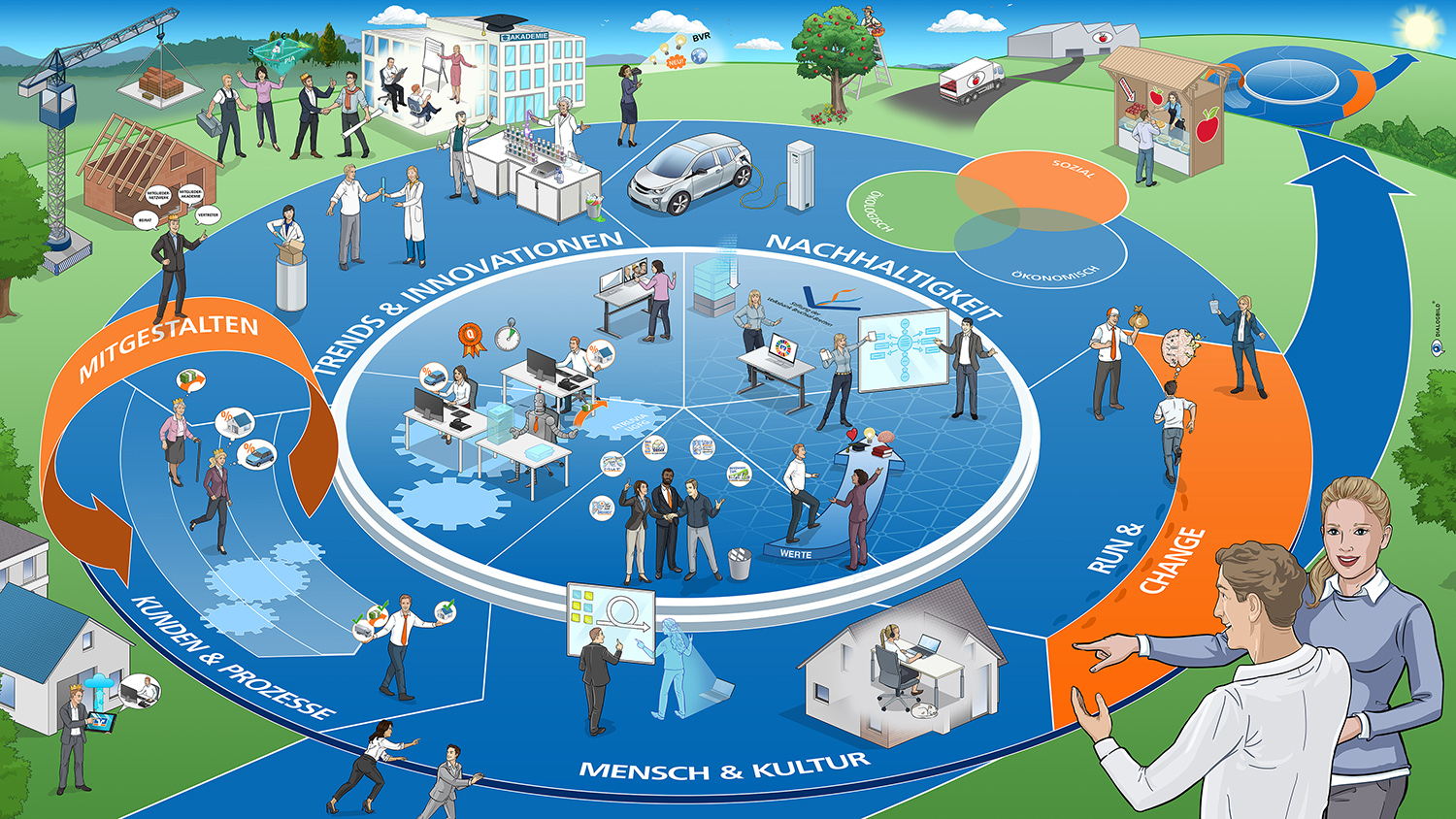
VISION & VALUES
COURAGE, SUSTAINABILITY, HONESTY, PRIDE AND ENTREPRENEURSHIP
How do we manage to deliver our vision and strategy to our employees, to bring everyone to a common understanding and to embed them into the (future) work to ensure that our bank is aligned as stable, successful and future-proof? How do we manage to deliver the path of our vision and strategy with the same content into our house, without losing important integral facts, or rather, to create room for interpretation through a new choice of words? These questions gave us the idea to translate our formulated vision and strategy into a picture-based language, true to the adage: “a picture says more than 1,000 words.”

SMART PLANNING
- THE FACTORY OF THE FUTURE
With over 1,000 employees, Production Planning / Brand Management VWN makes a decisive contribution to the long-term corporate success of the Volkswagen Commercial Vehicles brand.
The department is responsible for shaping the production of tomorrow. Interdisciplinary teams develop concepts for the implementation of new vehicle projects. In addition to influencing products towards a production-oriented product design, the department also focuses on the production and on-time provision of systems and components.
As part of the strategy work, a visual world was developed in collaboration with DIALOGBILD that focuses on the interaction of the individual departments and the common goal of a SMART PLANNING factory.

VISION 2030
OUR MOTTO: ALONG WITH YOU - WE ARE THE ONES WITH HEART
We are the ones with heart...
... a guiding principle that drives LIVISTO and its more than 500 employees in the development and manufacture of high-quality products for the health of farm and companion animals.
Thus, they work every day to create added value for veterinarians and pet owners and, moreover, to assist them with high-quality and efficient solutions.
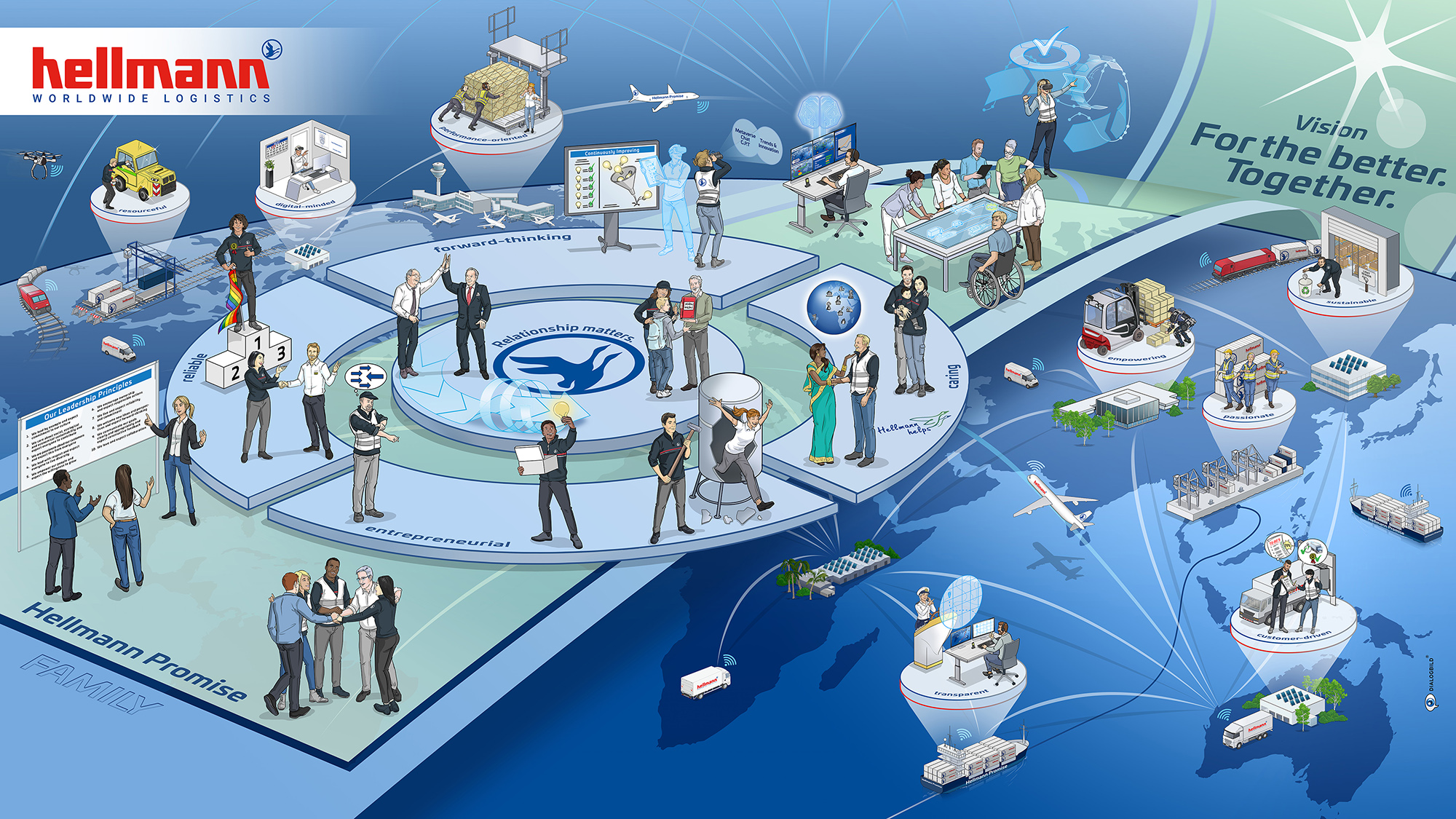
HELLMANN PROMISE
FOR THE BETTER. TOGETHER.
For more than 150 years, the family-owned company Hellmann Worldwide Logistics has successfully delivered top performance across a broad range of services - freight forwarding services by rail, truck, air and sea freight are complemented by CEP services, contract logistics and industry and IT solutions. What began with the transport of goods by horse and cart has evolved over the decades with technical innovations into state-of-the-art solutions.
To enable Hellmann Worldwide Logistics to meet the challenges of tomorrow, interdisciplinary work is already underway today on new visions. In order to position the company for sustainable success in times of constant change, a new corporate culture was defined, including a vision, mission and values. This globally valid culture, which connects all 14,000 employees, was to be conveyed in the dialog image and at the same time provided with a basic clarity.
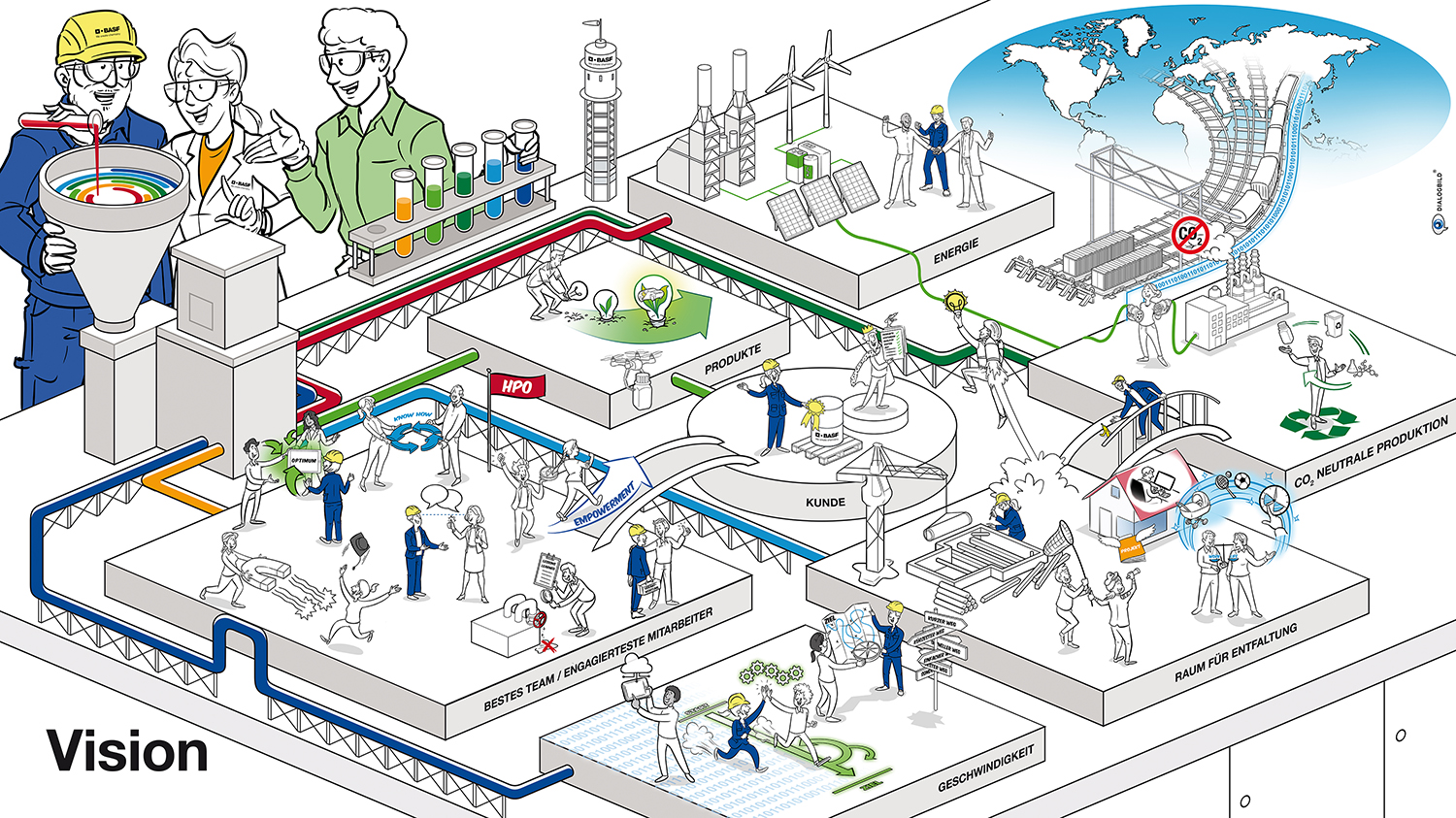
BASF Schwarzheide GmbH
BASF Schwarzheide GmbH is an industrial beacon in Lusatia and has been part of the BASF Group since 1990. More than 2,000 employees produce chemical specialties at the production site in southern Brandenburg. The product range includes polyurethane base products and systems, crop protection agents, water-based coatings, engineering plastics, foams, dispersions, laromers and, from 2022, battery materials. The site is growing and has set itself the goal of CO2-neutral production in the future and piloting the integration of renewable energies.
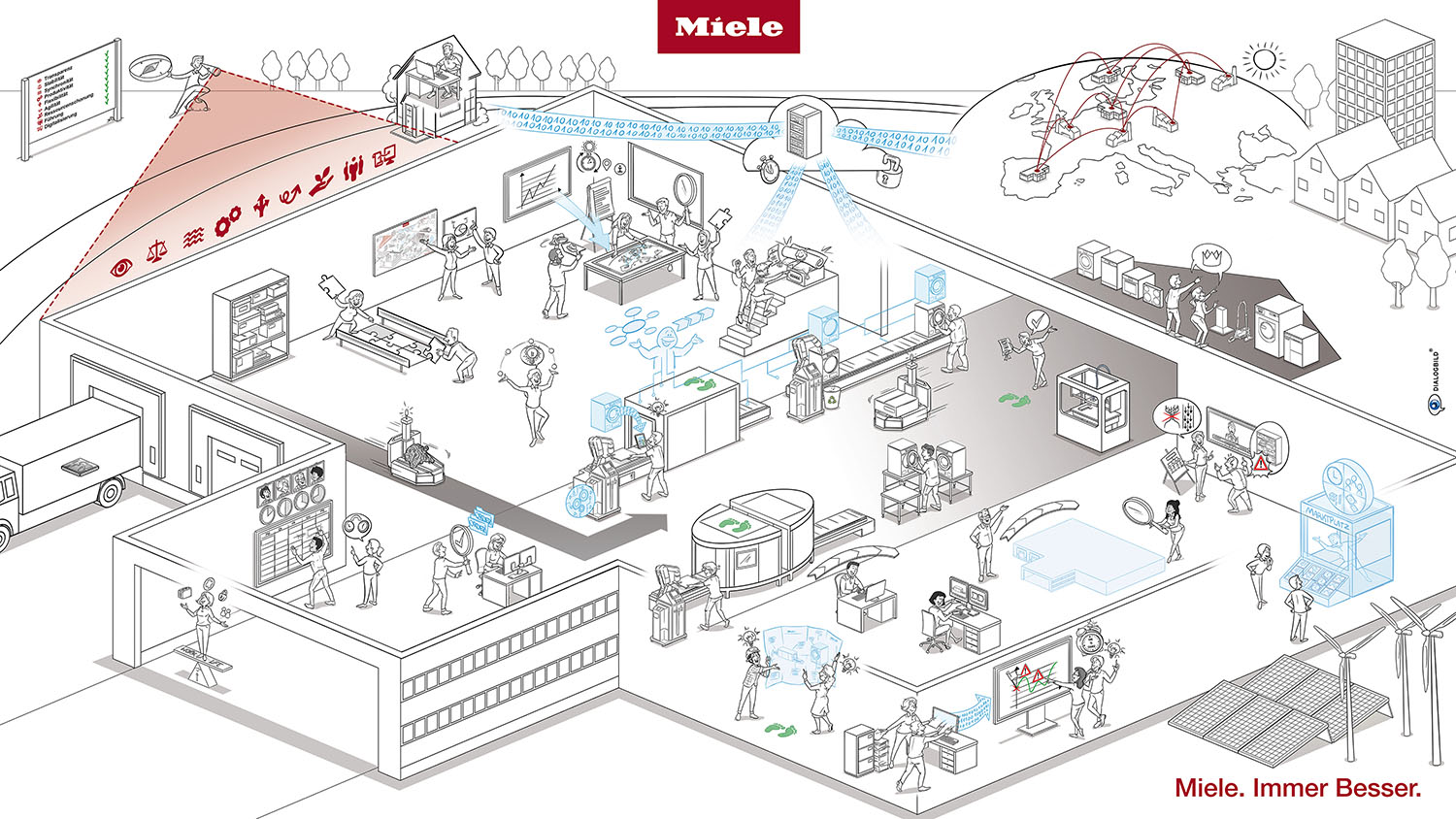
TARGET PICTURE OF THE MWS ORGANIZATION
Miele is the world's leading supplier of premium domestic appliances for kitchens, laundry and floorcare. In addition, there are air cleaners, washers and dryers for commercial use as well as washer-disinfectors and sterilizers for medical facilities and laboratories (Professional business division). Founded in 1899, the company operates 15 production sites, eight of which are in Germany.
In 2004, the Miele Value Creation System (MWS) was launched, which has been continuously developed over the years and is now a proven tool for improving processes and cooperation in production and administration, avoiding waste in the company and thus also increasing competitiveness.
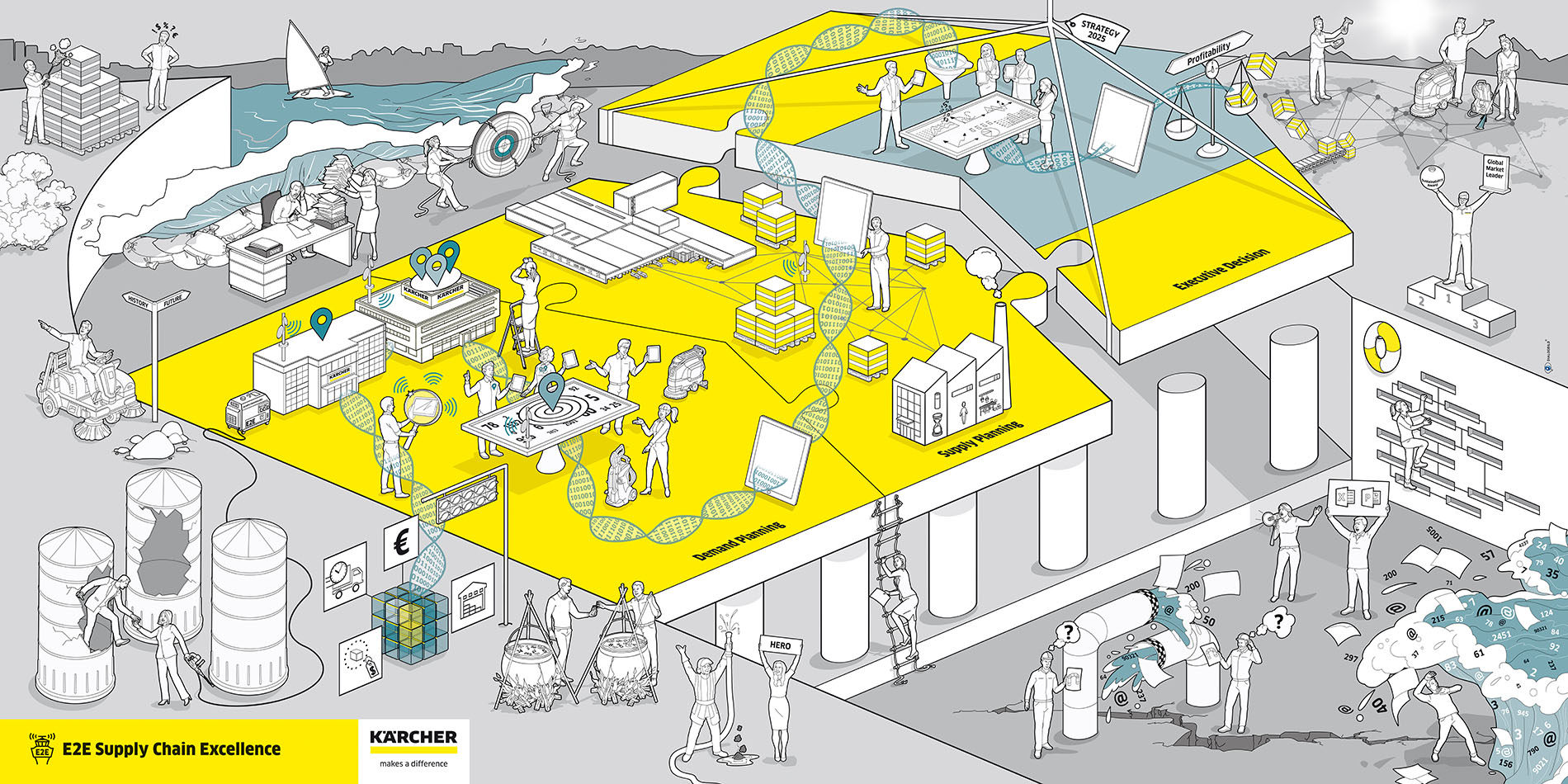
E2E SUPPLY CHAIN EXCELLENCE
Alfred Kärcher SE & Co. KG is a family-owned company headquartered in Winnenden, Baden-Württemberg. The world market leader for cleaning technology employs more than 13,500 people worldwide. The company is particularly renowned for its high-pressure cleaners.
In order to remain the world market leader in the future and to be able to supply customers optimally, Kärcher is constantly working on the optimization of its own supply chain management. The current strategy-relevant “End-to-End Supply Chain Excellence” project involves changes in processes, roles and responsibilities that will affect around 6,000 employees worldwide. In order to guarantee a uniform understanding of all project participants, Kärcher developed the dialog picture of the “E2E Supply Chain Excellence” change project, which was developed by DIALOGBILD accordingly.
The picture visualizes the process of the project as a path, starting from the current Kärcher reality. The viewer is informed about the new supply chain process to be implemented, in which he follows a bridge that leads to the future of Kärcher.

THE TARGET PICTURE
FOR ALMO PRODUCTS
Creating transparency about the target system, making it understandable and easy to communicate to all employees, providing the opportunity for personal identification and describing the way into the future to ultimately provide a higher-level orientation for the entire company - these were the reasons why ALMO decided to create a dialog picture.
Together with DIALOGBILD and Goldpark as professional partners, a dialog picture was developed and implemented for ALMO.
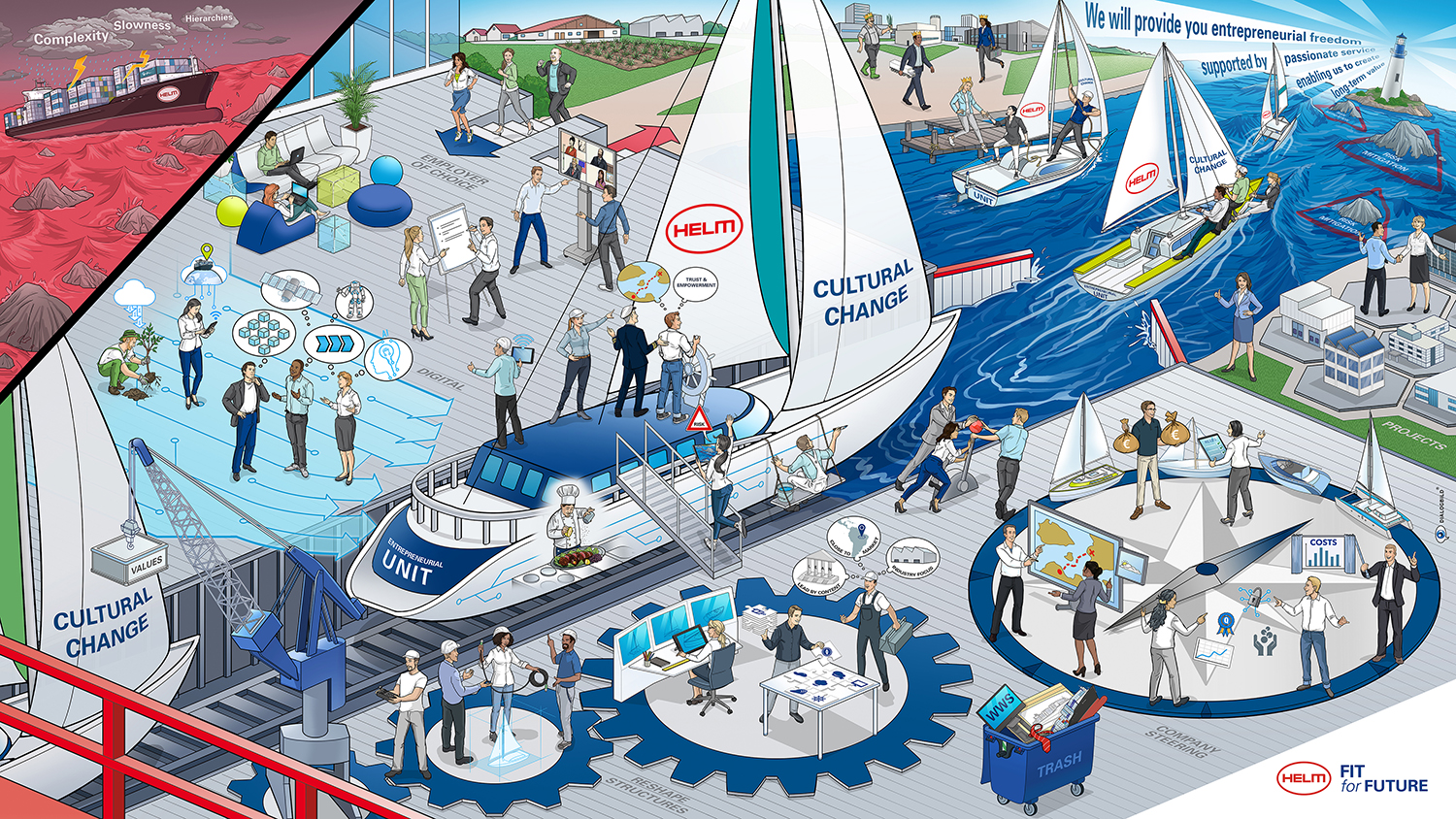
FIT FOR FUTURE
Helm is a globally active family-owned company headquartered in Hamburg, Germany. The fields of activity are the business units Chemicals, Fertilizer, Coop Protection and Pharma, which our company with its 1,500 employees takes care of.
In the course of the transformation process, we decided to use a dialog picture in order to communicate the different aspects and areas to our employees in an understandable and easy-to-remember way. For this purpose, each employee also received his or her own picture after the company meeting.
.jpg)
IMPROVEMENT VISION
WORKSHOP AND ILLUSTRATION
The dialog picture for the Bombardier factory was developed in several steps. Initially an internal workshop was organized for Bombardier employees, where they discussed and agreed upon dialogue picture topics themselves. Partly, first scene drafts originated that were meant to emerge in the picture later on. On the basis of the grid, which had already been used for another Bombardier factory, the positions of the individual scenes could be determined from the start.
The content, which had been worked out during the workshop, was forwarded directly to Dialogbild and implemented there by illustrators. The illustrations were sent back to Bombardier in a timely manner so that the employees were able discuss them in a workshop.
Frequently asked questions
What is meant by corporate philosophy?
The corporate philosophy encompasses the fundamental values, beliefs, and principles that guide a company's actions and decisions. It forms the foundation for the company's culture and mission statement.
Why is a corporate philosophy important?
A clear philosophy for your company provides guidance for employees and managers, strengthens the company's identity, improves employee motivation and retention, supports decision-making, and helps differentiate the company from the competition.
How does a corporate philosophy differ from a corporate mission statement?
Philosophy describes the "why" behind the company's actions, while the corporate mission statement focuses on the "what" and "how." The mission statement is derived from the philosophy and is often communicated externally.
What elements does a corporate philosophy include?
A comprehensive corporate philosophy typically consists of:
- Mission: The fundamental purpose of the company.
- Vision: A picture of the desired future.
- Values: The ethical principles that guide behavior.
- Principles: Concrete guidelines for behavior derived from the values.
How can I develop a corporate philosophy?
To develop a philosophy for your company, you should:
- Analyze the status quo.
- Define your core values.
- Formulate your mission and vision.
- Derive principles.
- Involve employees.
- Document and communicate the philosophy.
- Live the philosophy.
What role do managers play in implementing the company's philosophy?
Managers are crucial for embedding the company's philosophy. They must exemplify the values, communicate them regularly, and ensure that decisions are made in line with the philosophy.
How can I ensure that my company's philosophy is lived?
To ensure that your company's philosophy is lived:
- Integrate it into the recruitment process.
- Offer training.
- Conduct regular feedback sessions.
- Measure success through employee surveys and culture audits.
What challenges can arise when implementing a corporate philosophy?
Challenges can include resistance to change, discrepancies between proclaimed values and lived reality, and difficulties in measurement and evaluation.
How often should your company's philosophy be reviewed?
It is advisable to review your corporate philosophy regularly—at least annually—to ensure it remains relevant and is adapted to changes in the market or society.
Can a strong corporate philosophy influence business success?
Yes, a strong corporate philosophy can have a positive impact on business success by leading to higher employee productivity, better customer loyalty, and a stronger brand image.
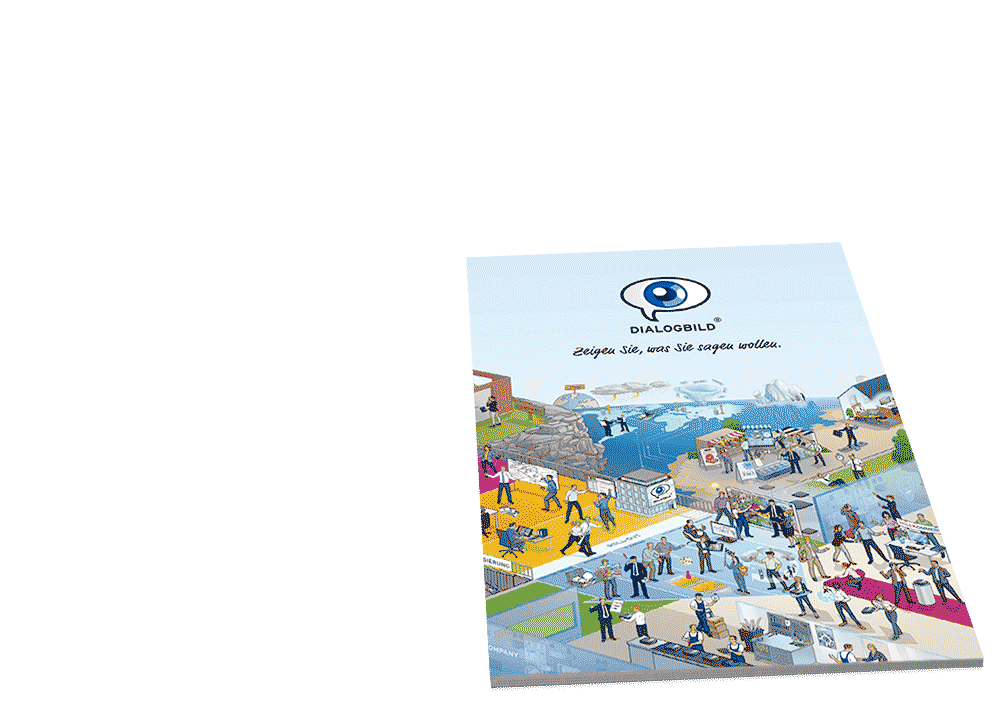 SELECT INFO PACKAGE
SELECT INFO PACKAGE